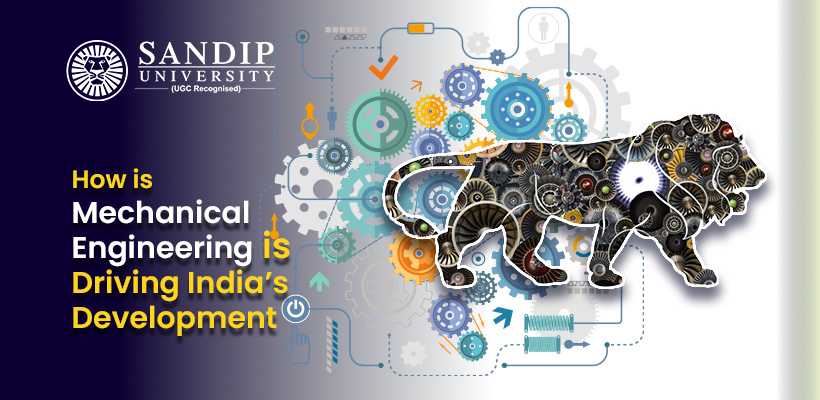Mechanical engineering stands as a cornerstone of technological advancement, shaping various industries worldwide. In India, the field of mechanical engineering has experienced remarkable growth, contributing to the nation’s progress, and playing a pivotal role in its industrial development. Some of the best mechanical engineering colleges in Nashik offer cutting-edge undergraduate and postgraduate programs to interested students who wish to create dynamic innovations in this field.
In this blog, we will delve into the fascinating world of mechanical engineering in India, exploring its historical significance, current landscape, notable contributions, and future prospects:
1. Historical Significance
Mechanical engineering in India traces its roots back to the ancient era, with remarkable advancements in areas such as metallurgy, architecture, and irrigation systems. Landmark engineering marvels like the Indus Valley Civilisation’s well-planned cities and water management systems showcase early Indian ingenuity. The advent of the Industrial Revolution in the 18th century further propelled mechanical engineering, and India witnessed its transformative effects during the British colonial period.
2. Current Landscape
a) Education and Research: India boasts a robust education system offering numerous institutions dedicated to mechanical engineering education and research. Premier technical institutes such as the Indian Institutes of Technology (IITs), National Institutes of Technology (NITs), and other esteemed universities offer comprehensive undergraduate and postgraduate programs, fostering a strong foundation in mechanical engineering principles.
b) Industrial Applications: Mechanical engineering finds widespread applications across diverse sectors in India. The automotive industry, heavy machinery manufacturing, aerospace and defence, energy, and construction sectors heavily rely on mechanical engineers for design, production, maintenance, and research and development activities. Moreover, emerging fields like robotics, automation, and renewable energy offer exciting avenues for mechanical engineers to contribute to cutting-edge technologies.
c) Entrepreneurship and Start-ups: India’s thriving start-up ecosystem has also witnessed notable contributions from mechanical engineers. Several entrepreneurial ventures have emerged in recent years, focusing on areas such as clean technology, smart manufacturing, and innovative product development. These start-ups embody the spirit of innovation and contribute to the country’s economic growth.
3. Notable Contributions
a) Space Exploration: India’s space agency, the Indian Space Research Organisation (ISRO), has made significant strides in space exploration. Mechanical engineers have played a crucial role in designing and manufacturing launch vehicles, satellites, and scientific instruments. India’s Mars Orbiter Mission (Mangalyaan) and Chandrayaan-2 lunar mission exemplify the nation’s prowess in space technology.
b) Automotive Industry: The automotive sector in India has witnessed exponential growth, with mechanical engineers at the forefront of innovation. Renowned Indian automobile manufacturers have developed indigenous vehicles, integrating advanced technologies while considering cost-effectiveness and performance. The Tata Nano, Mahindra e2o, and Ola Electric scooters are notable examples of Indian engineering excellence in the automotive sector.
c) Renewable Energy: Mechanical engineers have contributed significantly to India’s pursuit of clean and sustainable energy sources. From designing wind turbines and solar panels to developing efficient energy storage systems, their expertise has been instrumental in the country’s renewable energy sector. The future goal of India is to achieve 450 GW of renewable energy capacity by 2030 further highlights the critical role mechanical engineers will play in this domain.
4. Future Prospects
The future of mechanical engineering in India is promising, driven by technological advancements and the nation’s aspirations for industrial growth. Some key areas that hold immense potential include:
a) Robotics and Automation: With the increasing adoption of automation across industries, mechanical engineers will continue to be instrumental in designing and developing robotics systems, artificial intelligence algorithms, and automated manufacturing processes.
b) Sustainable Manufacturing: As environmental sustainability becomes a priority, mechanical engineers will focus on developing eco-friendly manufacturing processes, energy-efficient systems, and waste reduction techniques.
c) Advanced Materials and Manufacturing: The advent of advanced materials and additive manufacturing techniques presents exciting opportunities for mechanical engineers to revolutionise product design, manufacturing, and performance across sectors.
Conclusion
Mechanical engineering in India has evolved into a vibrant and dynamic field, contributing significantly to the nation’s industrial growth and technological advancements. From historic engineering marvels to pioneering contributions in space exploration, automotive innovation, and renewable energy, Indian mechanical engineers have demonstrated their expertise and ingenuity. As India continues to embrace the challenges and opportunities of the 21st century, mechanical engineering will play a vital role in shaping the country’s future, driving innovation, and contributing to sustainable development.

